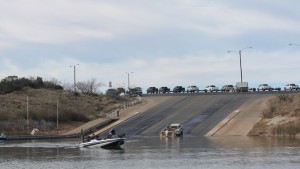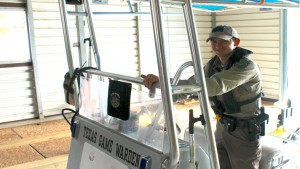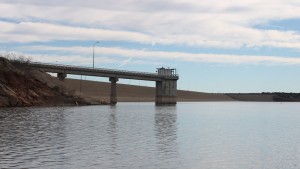“We fish it ’cause it’s the only water that’s around,” bass fisherman Bob Newman said as he and Jerry Roberts cast their lines on Lake Alan Henry.
Lake Alan Henry is located approximately 65 miles southeast of Lubbock and was built in 1993 as a reservoir by the city of Lubbock. The ongoing drought affects the area, which also serves as a recreational park and a home to several property owners and wildlife species.
Newman and Roberts, from Littlefield, Texas, started fishing Lake Alan Henry in 1996 and said they have noticed the drop in Lake Alan Henry’s water level.

“I was the first one out of our club that fished it,” Roberts said, “That was when you still had to unload on the dirt instead of a concrete ramp. It was 150 feet from the water, and the fishing was fantastic. You could come down here and catch fish, and it just gradually declined — like all new lakes do.”
Trey Kram, game warden for Scurry and Garza Counties, said Summer 2014 was the lowest he has ever seen the lake during his five years working with Texas Parks and Wildlife. He pointed at buoys in the lake marking areas where the water is too low for boats to safely go.
“There were rocks and stumps sticking up and crop damage to boats,” Kram said, “because there were obstacles in the water that hadn’t been there before. So, even people that knew the lake were hitting things because they’ve never had to worry about running their boats on some of these places.”
Aubrey Spears, the city of Lubbock director of water utilities, said inflows and evaporation affect lake levels. He said heavy rains in 2010 filled up Lake Alan Henry and nine feet of water went over the spillway. By the end of 2010, the area was in drought conditions again.
“We typically get about 19 inches of rain a year,” Spears said. “We only got 5 inches that year, which is the least amount we have ever received on record in about 100 years of keeping record of rainfall in this area. It was also the hottest on record, so there was a lot of evaporation, so we didn’t have a lot of inflow. There wasn’t a lot going into Lake Alan Henry.”
Roberts said he and Newman have also noticed the drought at Lake Alan Henry and other lakes in Texas.
“Well the drought has certainly had an impact on our lakes,” Roberts said. “I used to fish Fork quite a bit and Mckenzie and Stanford. Spence was never fuller than 35 feet low.”
Lindsay Masso has been coming to Lake Alan Henry since 1996 with her significant other, Bruce. The couple has been progressively building onto a lake house that started as a loft over a carport. As she pointed out her living room windows at an oak tree damaged by fire, she remembered the scorched ranches and charred roadsides along U.S. Highway 84.
Masso said she and Bruce almost lost their lake home in June 2011 during a wildfire. A neighbor had some welders building a carport on a day when the wind was blowing 30 mph, and the welding crew accidentally started a fire with sparks from their equipment.
“We lost trees that were 150 years old,” Masso said. “I was sick because I had fell in love with this lot ‘cause you know the trees, the big old oaks that are here, are one of a kind.”
Amidst the rocky landscape and mesquite and oak trees is wildlife — including white-tailed deer, coyote, feral hogs, bobcats, great blue heron and bobwhite quail. Trey Kram said the coyote and feral hogs have not been greatly affected by the drought.

“Hogs are one thing we don’t have a shortage of,” Kram said. “They’re just so adaptable. I don’t know much that can hurt them.”
On the other hand, Kram said the quail population has been hit hardest.
“Every other year it’s been horrible,” Kram said, “absolutely horrible to the point where I can say I think I’ve checked a quail hunter a couple times this year, but prior to that, in the past three years, I don’t think I have checked a quail hunter. Even the guys that were quail hunters and were hung ho would just let them go in the hopes they would come back.”
Lake Alan Henry has been stocked with several species of fish, including flathead catfish, white crappie and largemouth bass. The lake was once well known for the largemouth bass, but the population has shrunk partly due to the drought and the increasing spotted bass population. Kram said the spotted bass are known for aggressiveness.
Kram said the lake was once stocked with smallmouth bass and walleye but he has not checked any fishermen who have caught either one during his time as game warden.
Spears said the city of Lubbock has yet to tap the full potential of the lake.
“Some get kind of jittery when they see it go from 100 percent to 58 percent,” Spears said. “Then it jumps back up, but that’s the nature of reservoirs, particularly here in West Texas. We actually have to build reservoirs larger here than in East Texas because we have these pulse events where we need to capture that water. We would have loved to capture that water from 2010 that went over the spillway.”

Lindsay Masso said she and Bruce, as well as many other residents, know they need to conserve water.
“Water is like gold now,” Masso said. “It is very important that we conserve it.”